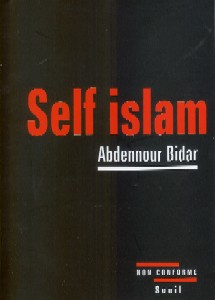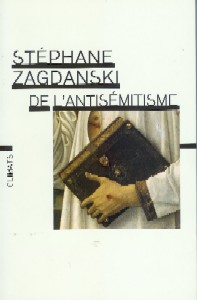 His name is Abdennour Bidar. Abdennour means: “Servant of light”. And the light, fortunately, has rewarded him well. He explains that this name “inspired his imagination”. In terms of imagination, a real lifeline. This was necessary in a childhood journey tossed between an Auvergnat grandfather who was a winemaker and an atheist communist, a mother who converted to Islam shortly before his birth, and a Moroccan whom he “considered as his father”, a Muslim proselytizer of Pakistani fundamentalist Tabligh. One would be spiritually torn apart with less.
His name is Abdennour Bidar. Abdennour means: “Servant of light”. And the light, fortunately, has rewarded him well. He explains that this name “inspired his imagination”. In terms of imagination, a real lifeline. This was necessary in a childhood journey tossed between an Auvergnat grandfather who was a winemaker and an atheist communist, a mother who converted to Islam shortly before his birth, and a Moroccan whom he “considered as his father”, a Muslim proselytizer of Pakistani fundamentalist Tabligh. One would be spiritually torn apart with less.
Worthy of Victor Hugo for its plot and Emile Zola for the darkness of its realism, the episode of paternal abandonment at age 5 — the father follows his coreligionists one night, leaving little Abdennour alone in a mosque where he spends the night — will reinforce his demand to understand. The internalized pain of loss soon gives way to an insatiable thirst for research. The immensity of the former signifies the absoluteness of the latter. At the same time, it smooths out the darkest aspects: through the child’s eyes, the father’s “fanaticism” becomes “peaceful and joyful”. In memory of this forever lost father, Abdennour becomes a seeker. In this quest for meaning, his mother’s Islam and philosophy, an improbable parental substitute couple, provide him essential support. His mother embodies this deeply internal Islam, which relies on the prescriptions of ritual to better transcend them and draw authentic spirituality from them. An incessant dialogue that also involves an early initiation into reading. Then comes his philosophy teacher whose words on Plato’s allegory of the cave take on the value of an oracle. Again a question of light, but this time, it must be sought outside. It is not surprising that his initiatory journeys lead the author to cross paths with the “wise René Guénon”. Abdennour Bidar gives him, without explaining, a central place in his thinking: it is true that this proponent of religious syncretism — he was also a Freemason engaged in the Primordial Tradition — chose to embrace the Prophet’s religion at the end of his life. A highly suspicious figure in the eyes of radical and intolerant Islam, whose strict enclosure is strongly denounced by the author.
Nevertheless, those who seek shall find. At least he thought it would be in Paris. But the small, parochial intellectual world of the Capital, pitiless with its provincials, does not meet his hopes: “they had read the West, I had meditated the East”. In the battle between Deleuze and Sartre against Ibn Arabi and Rumi, the battle was lost from the start. Hardly had he passed the entrance exam to the École normale with difficulty, he quickly abandons it in turn. His preference “to seek a spiritual master in the East” leads him and his future wife into a movement that rapidly takes on the characteristics of a sect. Young Abdennour thus surrenders nothing on his desire. At the price of a total collapse that allows for a new start… in Nice. Like Sophocles, it is when he was reduced to nothing “that he truly became a man”. This moving book, which “bears witness” to the personal construction of an identity, shows the thousand meandering paths that allow for access. Despite his “inability to connect the worlds” between which he was divided, Abdennour finally discovers the man hidden behind the believer. A faith that has become human. He can then settle his scores. First with this fundamentalist Islam, then with its proselytes and adherents, of which he could have been a heir by paternal tradition in our time. To this “untouchable” Islam that, in a “crude trap”, exploits the tolerance of democracy, to these dogmatic ones who veil women in a “collective pathology”, the author wishes to oppose an Islam of enlightenment, a “bonhomme” religion, according to anthropologist Malek Chebel. For him, it is impossible to achieve this without a revolution that would transition the believer from “forced submission” to “chosen obedience” and would lead him on the path of ihsan, “excellence”, the spiritual fulfillment. Sufism is not far off. And with it, this elevation in solitude that the author must often feel in the face of so much incomprehension from his peers.
While he borrows some passages from St Augustine, perhaps what is missing in Abdennour Bidar’s reflection is a passage through Judaism. A form of return to the sources that the Quran itself does not contest: “Then We gave to Moses the complete Book as a reward for the good he had done…” (Surah 6 Al-An’am, v.154). 
The Book constitutes precisely the heart of the particularly stimulating reflection, well in line with the “climats” collection (Flammarion) by Stéphane Zagdanski on “anti-Semitism”. Halfway between Jewish humor, a form of resistance to persecutions according to Joseph Klatzmann (“L’humour juif”, Que sais-je? 3370, PUF) and self-mockery, Stéphane Zagdanski enlightens us on one of the fundamental reasons for the mechanism of “historical intolerance towards Jews”, provided that, to follow him on the very terrain of Hebrew commentary, we are still in the realm of reason. The fundamental belief of Judaism, he explains, rests on a theological revolution: “The writing of the Torah precedes the creation of the world”. This implies the heavy unconscious burden of a word whose divine meaning pre-existed in the night’s depths and to which the 22 “square letters” of the Hebrew alphabet strive to offer an uncertain earthly support. From there arises the unalterable exercise of rabbinical commentary, which consists of questioning, attempting to discover the spirit behind the letter in a recurring exegesis. From “pilpul”, this known “dialectical boomerang” wherein one answers a question with another question to “Mahloket”, this permanent and dynamic controversy, never concluded and for good reason, about the interpretation to give to the foundational texts, so many concepts that testify to this initial word forever “lost” and illustrated by the omission, in biblical Hebrew, of “the trace of the present”. Far beyond the Saussurian arbitrariness of the sign, the Lacanian “jeu/je” between the signified and the signifier, Zagdanski leads us, perhaps with the secret hope of losing us (but isn’t it already anti-Semitism, if one gets into the author’s game, to think and especially to fear it?), into a dense jungle of corpus (the rolls of the Torah) and cascading midrashic commentaries. It becomes clear that “anti-Semitism according to Zag”, to speak as a Christian, in a way sources from the fear of the void, the awareness of the intangible, both consecrated by the unpronounceable and ineffable divine Tetragrammaton “YHWH”. With sometimes grim humor whose secret connection to Judaism becomes apparent as one reads along, Zagdanski discusses the habitual supports of anti-Semitism, but always returns to the transcendence of the letter which allows Jews to escape, to flee within their Judaism.
In these times of purported international conference on the “Holocaust” that serves as a pretext for spreading the most virulent anti-Semitism, Stéphane Zagdanski’s work would — almost — offer something to reassure us. The “final solution” was indeed, according to him, an attempt to annihilate this questioning within itself. In this sense, the plurimillennial attacks of which Jews have been and are still the object perfectly reflect the insoluble enigma of which they remain the eternal custodians.
Abdennour Bidar, “Self Islam”, Editions du Seuil, Coll. “non conforme”, 2006, 235 pages, 12 euros.
Stéphane Zagdanski, “De l’antisémitisme”, Editions Climats (Flammarion), 2006, 378 pages, 21 euros.
jlvannier@free.fr


